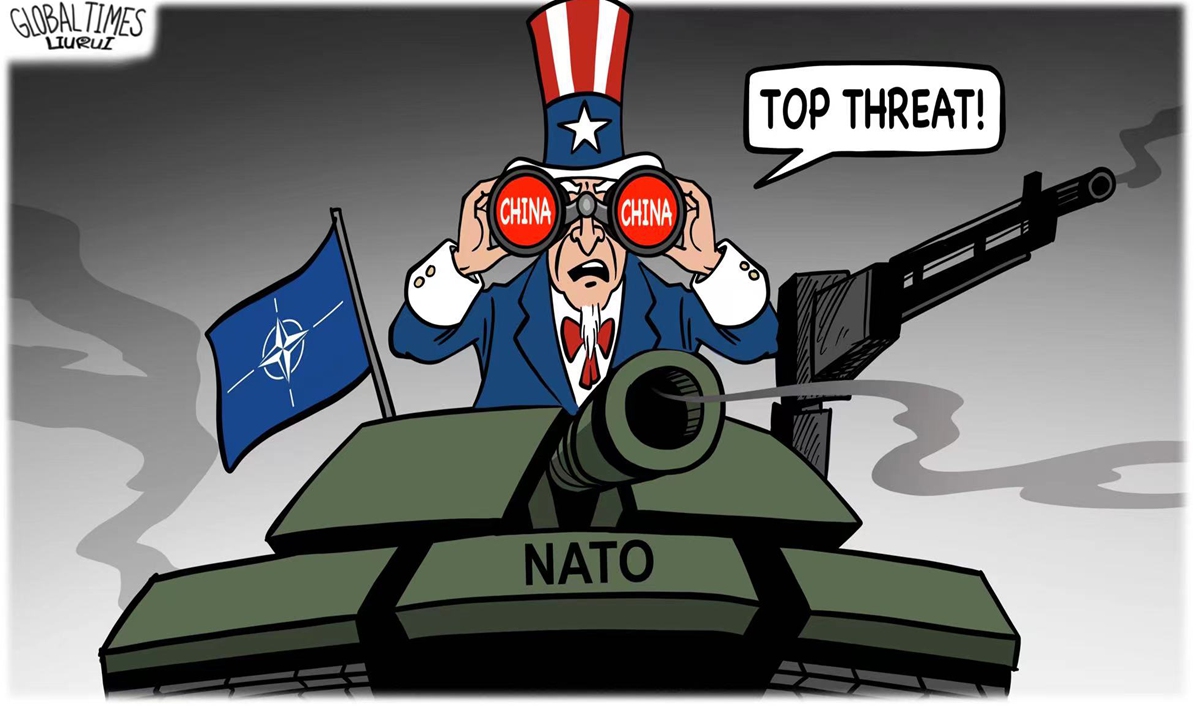
Illustration: Liu Rui/GT
NATO launched a strongly worded attack on China in the Vilnius Summit Communiqué issued on Tuesday. The joint statement pointed an accusing finger at China's so-called "coercive policies," and its deepening strategic partnership with Russia. It also accused China of being opaque about its military build-up, especially when it comes to expanding its nuclear arsenal, and using its economic leverage to "create strategic dependencies." Some have summarized that this year's NATO joint statement contains 322 English words related to China, compared to 304 and 225 words in the previous two years.
NATO's statement gives the impression that China is right on the doorstep of the North Atlantic, with its military power already confronting NATO forces in the North Atlantic, similar to a standoff between Chinese and American warships and aircraft in the Taiwan Straits and South China Sea. However, in reality, the North Atlantic is the furthest ocean from China, and the anti-China rhetoric in NATO's statement is merely transplanted from that of the US. It is unimaginable for Chinese people that our military would engage in combat, stage demonstrations in the North Atlantic against NATO forces or threaten and intimidate a NATO member country. Similarly, Europeans would find it difficult to envision such a scenario. The accusations against China in NATO's statement are essentially a self-portrait of the US and Western powers who are engaging in power projection and interference worldwide.
The US is encouraging Europeans to come to the Taiwan Straits and the South China Sea to "defend Europe," which is ridiculous. The Earth is not as small as a globe. With the support of NATO Secretary General Jens Stoltenberg, Washington also conspired with Japan to propose the establishment of a NATO liaison office in Tokyo. Due to France's insistence that NATO should represent the North Atlantic and opposing NATO globalization, the plan to open a Tokyo office was temporarily aborted, and this joint statement did not mention the matter at all. Australia's former prime minister Paul Keating accused Stoltenberg of "conducting himself as an American agent more than he performs as a leader and spokesperson for European security."
However, although the plan to open a Tokyo office has failed, the attempt to expand NATO's influence into the Asia-Pacific region will not disappear. During this summit, the so-called "Asia-Pacific Four" - namely Japan, South Korea, Australia and New Zealand - held a sideline meeting, highlighting the connection between NATO and the Asia-Pacific region. Chinese people should be clear that the US' efforts to project influence toward China's periphery through NATO will continue, and we must be fully prepared for this. It is highly likely that some NATO member countries, along with Japan and others, will engage in disguised military cooperation games around China, and plans such as opening offices in Asia could be put back on the table. China needs to be highly vigilant and have contingency measures to counter such moves.
While responding seriously to the expansion of NATO in the Asia-Pacific region, we must maintain strategic composure, and accurately assess the actual impact of each NATO action. When European countries gather together under the US leadership, the "China threat" is made vividly apparent. However, when they return home and engage in their own domestic and foreign affairs, China's role as a cooperative partner will become evident again. China is far away from each European country. Any talk apart from economic and trade exchanges and cultural exchanges is nonsense. The growing of China's power and influence has indeed made some European countries feel uneasy, but they understand that this is mainly a change in the competitive landscape, and NATO cannot help solve this problem. Many Europeans understand that the US is trying to strengthen its own position against China by wooing them, and they are following the US' lead within the framework of NATO, with some calculations to benefit from both the US and China.
China must resolutely resist NATO, but the issue with NATO and the US should not all be transferred to specific European countries. We still need to develop relations with European countries and the European Union and avoid falling into the US-created trap of China-Europe confrontation. We must fully mobilize China's profound and extensive Tai Chi thinking and calmly engage in the current and future complex situation.
The author is a commentator with the Global Times. opinion@globaltimes.com.cn

